- Bernard Preston homepage
- Starch
- Glycemic Response to Beer
Glycemic response to beer
The glycemic response to beer and all carbohydrates for that matter, can be worrying if you are prediabetic. Any starch that is rapidly absorbed causing a spike in blood-glucose draws a corresponding spurt of insulin from the pancreas; high sugar levels damage the arterial lining.
Repeated many times a day, eventually resistance to insulin sets in; sugars are not absorbed into the cells demanding an even greater amount of the hormone. It's the recipe for an early demise.
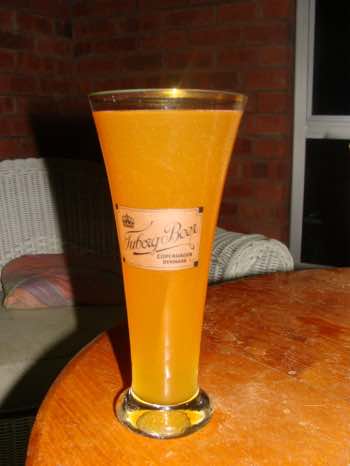
This page was last updated by Dr Bernard Preston on 6th April, 2024.
Since I am myself prediabetic, there are obviously concerns whether beer and other starchy foods could be contributing to an early stroke or heart-attack. Whilst not wanting to be alarmist, life is good; I have no desire to lose a foot or go blind long before my time.
Research shows that nearly a third of the adults in large communities in South Africa are now fully diabetic[1]; the implications are simply vast. Refined-carbohydrates, ultra processed foods and alcohol are the problem; and a sedentary existence.
It probably seems macabre but mutilating your fingers and testing your own blood is both inexpensive and extremely interesting.
More than 50-percent of diabetics are walking the streets not knowing they have a very serious disease that is going to cut short their lives. The end will be miserable and painful; it's a sobering thought.
And
so I have tackled the topic of the glycemic response to beer and other
starches that I consume. It is a complex subject; I will not pretend
otherwise. But it has the potential to add ten good-years to my life; and yours too. I think it is eminently worth the pricks to which my fingers are
being subjected.
I am a blood-donor; yesterday's jab by the vampire was far more intimidating with a much larger needle but one does that for altruistic reasons.
Glycemic response to beer
The glycemic response to beer occurs because of the alcohol and malt-sugar, both of which are carbohydrates which are digested in the small intestine; they raise blood glucose.
It is in principle no different
to a candy bar or glass of coke. Surprisingly diet sodas are even more
likely to cause you to become resistant to insulin and diabetic than those with sugar; if you
value you well-being, avoid artificial sweeteners. It's a complex subject tied in with brain food.
So we all know that alcohol certainly affects our brains; some it turns violent and a few it simply puts to sleep. It dulls the senses and makes us dangerous to both ourselves and others if we get behind the wheel of a car.
But we love it and will no doubt continue to enjoy our alcohol. In the context of covid-19, with a total ban on the sale of booze in South Africa in April and May, 2020 I revived an old hobby; brewing honey brown beer.
Using honey instead of sugar it is known as a braggot; but what is the glycemic response of my body to beer in general?
In the context of insulin resistance, stroke and cardiovascular disease what does your favourite tipple do to the blood-sugar? Do we get a massive spike and what is it like after two hours? I set out to get some answers.
You of course will most likely react very differently, given the context of your lifestyle and the food you eat; and the state of your pancreas. I recommend you test yourself. It's easy.
I decided to test my glycemic response to beer exactly in the way that I normally enjoy it; a quart before dinner at night. I could have cheated and first had a glass and then one course of food followed by another few mouthfuls; but that would have changed the result drastically.
No cheating is allowed.
Plus in the evening, unlike during the day when I go out and keep physically busy after a starch of which I am suspicious, at night I am a couch-potato; I sit down at the computer and write boring pages like this. You test yourself exactly in the way you enjoy your beer.
In fact that has now all changed. So intent was I to get my HbA1c down to normal that I committed to an 8 minute brisk "Swedish stroll" after dinner.
What do you need? A glucometer, a stabbing lance and a little card that is inserted into the device. In two-hours after four pricks of the fingers you will know exactly where you stand regarding the glycemic index of beer; or wine for that matter.
Minutes
-
0
30
60
120
Glucose
(mmol/L)
4.3
5.2
6.5
5.6
Glucose
(mg/dl
78
94
116
101
Food
-
Water + 2gl beer
1 gl beer
Dinner
Food
Beer
Dinner
Contains
- 730 ml beer
- Fresh lima and broad-beans
- broccoli
- 1 egg
- 1 slice wholemeal bread and butter.
Carb
26g
15 + 5 + 0 + 15 = 35g
Total carbohydrate for the meal amounts to 61g; but quite a lot is resistant starch.
If you are diabetic, this amount of starch at one sitting with no exercise, would be disastrous; those glucose readings would for you be quite different. If we cheat, thinking we are clever, by using a little extra of the hormone it just hastens the day of that stroke or heart attack; or loss of half a foot. We become more insulin-resistant.
Simply going without that beer would halve the glycemic-load; luckily I am not diabetic and so I continue to kid myself that it is not doing me much harm.
If I had succumbed to ice cream and hot chocolate-sauce after dinner, then I would have been a gonna; one cup could easily add another 50g of carbohydrate.
In fact when my fingers have recovered, I will have exactly
the same meal, testing for the glycemic response to beer but add a cup
of my favourite dessert; that reading after two hours will be quite
different I suspect.
This is really just about taking responsibility for our own well-being; and finding out which carbohydrates spike our blood glucose. Freshly squeezed orange juice is my Achilles heel and I love it; so small amounts only, much diluted and a short ten minute walk after breakfast keeps the surge under control.
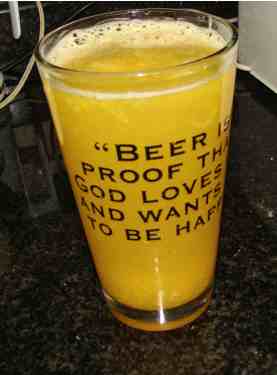
Oh
and what does that homemade braggart in the photo at the top do to my
blood glucose? Beer made with honey instead of sugar is my big favourite.
I have yet to test that but because the sugars are completely fermented, I
suspect it will be little different to an ordinary pale-ale. It will be a
lot more nutritious with the phytochemicals found in the raw, unheated product of the beehive. It is also a probiotic.
Three rules of thumb have become apparent;
- Any
carb not enjoyed in the context of a meal spikes my blood-glucose; so
no cookies at teatime or candy bar in the afternoon. Not even a
slice of bread is allowed. Absolutely no snacking between meals is the solution.
- Following a high carb meal with exercise ameliorates the effect on the blood-sugar; even a short walk. A snooze after lunch means I am in for a glucose spike.
- If I have a hearty breakfast like our Eggs Hilton then I am not hungry all day and have no need to snack; it is the satiety-factor that legumes provide, sometimes called the "subsequent meal effect."
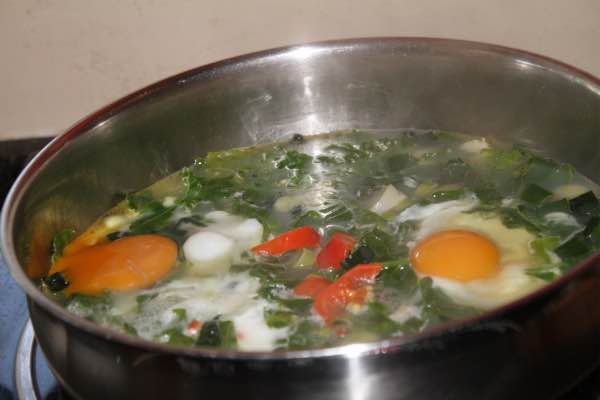
Newsletter
Our newsletter is entitled "create a cyan zone" at your home, preserving both yourself and Mother Earth for future generations; and the family too, of course. We promise not to spam you with daily emails promoting various products. You may get an occasional nudge to buy one of my books.
Here are the back issues.
- Lifestyle and ideal body weight
- What are ultra-processed foods?
- Investing in long-term health
- Diseases from plastic exposure
- Intensive lifestyle management for obesity has limited value
- A world largely devoid of Parkinson's Disease
- The impact of friendly bacteria in the tum on the prevention of cancer
- There's a hole in the bucket
- Everyone is talking about weight loss drugs
- Pull the sweet tooth
- If you suffer from heartburn plant a susu
- Refined maize meal and stunting
- Should agriculture and industry get priority for water and electricity?
- Nature is calling
- Mill your own flour
- Bake your own sourdough bread
- Microplastics from our water
- Alternative types of water storage
- Wear your clothes out
- Comfort foods
- Create a bee-friendly environment
- Go to bed slightly hungry
- Keep bees
- Blue zone folk are religious
- Reduce plastic waste
- Family is important
- What can go in compost?
- Grow broad beans for longevity
- Harvest and store sunshine
- Blue zone exercise
- Harvest and store your rainwater
- Create a cyan zone at your home
Gluten
Beer is made from barley, hops and sometimes wheat. Gluten is found in both grains; an intolerance is not uncommon causing abdominal pain, bloating and diarrhoea in severe cases.
It behooves all drinkers to know something of the meaning of gluten.
Then together with the knowledge of your own glycemic response to beer, it gives you complete control.
Knowledge is power.
Commercial alcohol causes cancer
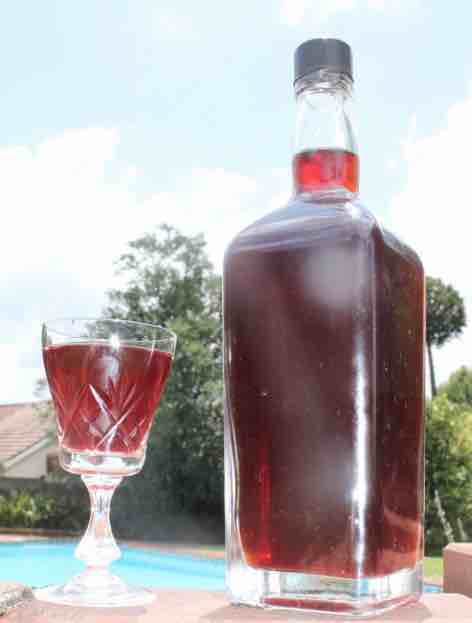 Home brewed mulberry mead
Home brewed mulberry meadDisturbingly there is strong evidence (over 200 papers) confirming that even small amounts of commercial booze increase the risk of cancer. There are so few people doing a home brew that there is no research concerning whether it is the alcohol per se or some other toxic chemical; for example Neonics used in growing the barley and hops. Fungicides on grapes are a worry too.
What is known is that the Blue Zone people drink quite large amounts of locally-brewed, unpasteurised wines and beers with their meals; and enjoy long and fruitful lives.
With this in mind I personally have turned my back on beer and focused instead on homemade mead. Honey from towns and villages far from commercial agriculture is free from pesticides; likewise the fruit such as mulberries from our own garden used in making melomels.
Luckily the glycemic response to mead is low. My HbA1c is 5.4 now since eschewing all refined carbs; quite normal.
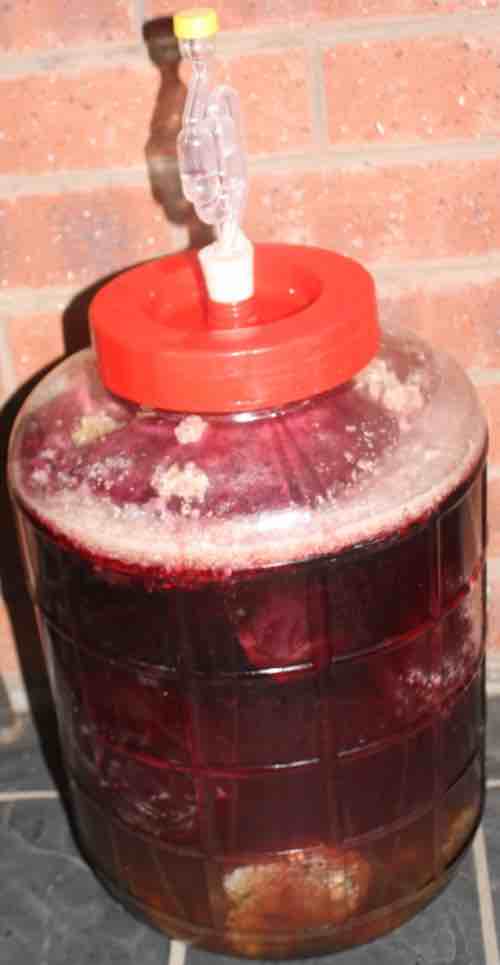 Mulberry honey mead
Mulberry honey meadWe will not know about the safety of home brewing until scientists look at this option; which is frankly not expected as the numbers are small. Alcohol may yet turn out to be the spoke in the wheel that causes cancer.
When browsing use right click and "Open Link in New Tab" or you may get a bad gateway signal.
Did you find this page interesting? How about forwarding it to a friendly book or food junkie? Better still, a social media tick would help.
- Bernard Preston homepage
- Starch
- Glycemic Response to Beer
Address:
56 Groenekloof Rd,
Hilton, KZN
South Africa
Website:
https://www.bernard-preston.com